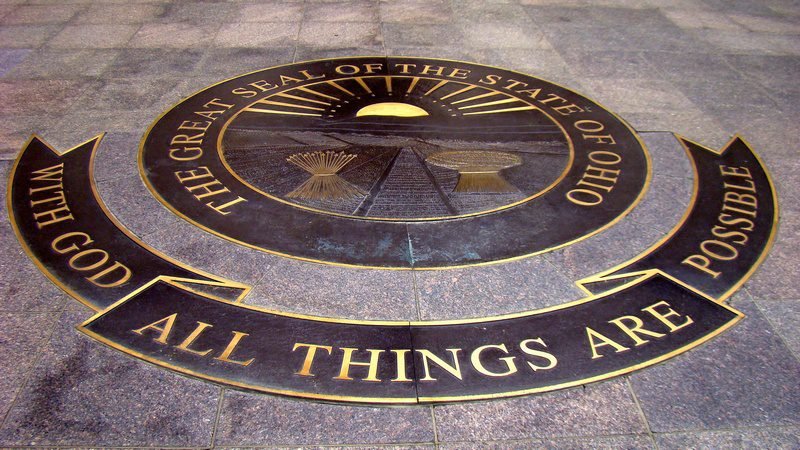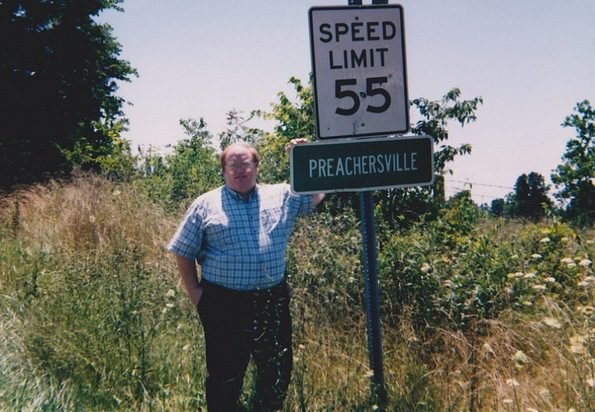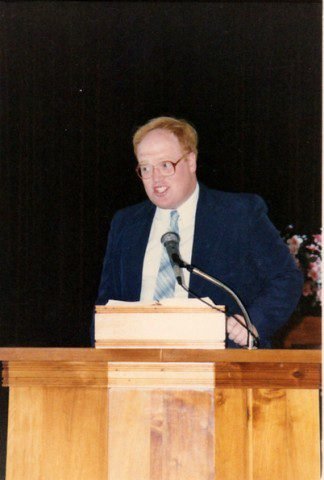
The state motto for Ohio is “With God, All Things Are Possible.” Is this theological statement really true? First, “God” in this statement is not just any old deity, it’s the Christian God. And as far as Evangelicals are concerned, this God is theirs alone. Evangelical orthodoxy states that Catholics, Mormons, Jehovah’s Witnesses, liberal Christians, and other sects deemed heretical worship false Gods. For Evangelicals, the God of all things possible is the God of the inspired, inerrant, infallible Bible. It is through the Bible (and conscience and nature) that God reveals himself to us, thus God is who and what the Bible says he is.
Second, are ALL things really possible with God? 1 John 5:14, 15 says:
And this is the confidence that we have in him, that, if we ask any thing according to his will, he heareth us: And if we know that he hear us, whatsoever we ask, we know that we have the petitions that we desired of him.
This passage says that only those prayers that line up with God’s will shall be answered by God. This is what I call God’s “divine escape clause.” Countless other verses, however, explicitly say and or imply that whatever Christians ask of God, he will grant it to them. John 14:13, 14 says:
And whatsoever ye shall ask in my name, that will I do, that the Father may be glorified in the Son. If ye shall ask any thing in my name, I will do it.
John 15:16 adds:
Ye have not chosen me, but I have chosen you, and ordained you, that ye should go and bring forth fruit, and that your fruit should remain: that whatsoever ye shall ask of the Father in my name, he may give it you.
And finally, John 16 22-24 says:
And ye now therefore have sorrow: but I will see you again, and your heart shall rejoice, and your joy no man taketh from you. And in that day ye shall ask me nothing. Verily, verily, I say unto you, Whatsoever ye shall ask the Father in my name, he will give it you. Hitherto have ye asked nothing in my name: ask, and ye shall receive, that your joy may be full.
These statements are in RED in the Bible, so that means Christians believe Jesus said these things. Another RED passage on the subject is found in Sermon on the Mount in Matthew 7:
Ask, and it shall be given you; seek, and ye shall find; knock, and it shall be opened unto you: For every one that asketh receiveth; and he that seeketh findeth; and to him that knocketh it shall be opened. Or what man is there of you, whom if his son ask bread, will he give him a stone? Or if he ask a fish, will he give him a serpent? If ye then, being evil, know how to give good gifts unto your children, how much more shall your Father which is in heaven give good things to them that ask him.
Independent Fundamentalist Baptist (IFB) evangelist John R. Rice, wrote a book titled Prayer: Asking and Receiving. Rice believed in a formulaic approach to prayer: ASK and RECEIVE. Based on the aforementioned quotes from the gospels, Jesus believed the same. Evidently, by the time we get to the writer of 1 John, things had changed a bit. Instead of prayer being simply asking and receiving, answered prayer was contingent on praying according to the “will of God”; a will, by the way, that no mere mortal knows. The LORD says in Isaiah 55:8,9:
For my thoughts are not your thoughts, neither are your ways my ways. For as the heavens are higher than the earth, so are my ways higher than your ways, and my thoughts than your thoughts.
Thus, when we see how this whole praying thing works out in real life, suggesting that “all things are NOT possible with God,” Evangelicals will appeal to God’s escape clause to defend his callous indifference to the plight of his Creation. God, then, is never accountable or responsible when Christian prayers go unanswered. “You didn’t ask according to my will,” God says. When the sincere believer asks, “Jesus, what is your will?” the King of Kings replies, “Oh I can’t tell you. That’s just between me and Dad. Besides, even if I told you, you wouldn’t understand. Me and Dad, our thoughts and ways are higher than yours and beyond human understanding.” Christians, then, are either left with choosing to believe what they can see and know or turning off their intellect and critical thinking skills and believing as Romans 8:28 says: “And we know that all things work together for good to those who love God, to those who are the called according to His purpose.” Most Christians, sadly, choose the latter. When occasional lapses of faith or doubt force them to face the irrational nature of prayer, they are reminded of Paul’s words about doubting God:
Therefore hath he mercy on whom he will have mercy, and whom he will he hardeneth. Thou wilt say then unto me, Why doth he yet find fault? For who hath resisted his will? Nay but, O man, who art thou that repliest against God? Shall the thing formed say to him that formed it, Why hast thou made me thus? Hath not the potter power over the clay, of the same lump to make one vessel unto honour, and another unto dishonour? (Romans 9:19-21)
In other words, shut the fuck up. God is the sovereign ruler over ALL, and he does whatever he wants to do. End of discussion.
Christians who trust what they can see and know instead of Bible proof texts and unsupportable faith claims are left with a conundrum of epic proportions: God rarely, if ever, answers their prayers, and there is no evidence for the theological claim, With God, All Things Are Possible. Countless Christians in the Middle East pray daily for God’s protection — surely a prayer the Big Man Upstairs would want to answer, right? Yet, these followers of Jesus continue to be slaughtered by Muslim jihadists or killed by the actions of the American war machine. In Africa, countless Christians earnestly pray:
Our Father which art in heaven, Hallowed be thy name. Thy kingdom come, Thy will be done in earth, as it is in heaven. Give us this day our daily bread. And forgive us our debts, as we forgive our debtors. And lead us not into temptation, but deliver us from evil: For thine is the kingdom, and the power, and the glory, for ever. Amen. (Matthew 6:9-13)
And yet, they continue to have their daily food and water needs unmet. While they are starving to death, God, evidently, is too busy directing an American Christian to the location of her keys or working any of the innumerable “miracles” Western Christians say he does every time they dial his number, to stop and feed the hungry. Does God’s behavior not contradict what the Psalmist said in Psalm 37:25, 26?
I have been young, and now am old; yet have I not seen the righteous forsaken, nor his seed begging bread. He is ever merciful, and lendeth; and his seed is blessed.
Everywhere we look we see the followers of Jesus and unbelievers alike forsaken and begging for food. Where is this God of mercy, this God of love and compassion? From my seat in the atheist pew, he is nowhere to be found. Which stands to reason, since the Christian God exists only within the pages of the Bible. God is the leading character in a work of fiction.
The reason Christianity still exists in the twenty-first century is that Christians either choose faith over fact or they choose to live with cognitive dissonance. The latter know the evidence points to the nonexistence of the Christian God — any God, for that matter — yet they believe anyway. Why? Most often, such people want to believe that there is more to life than the present; that there is life after death. They are willing to live with cognitive dissonance because doing so meets some sort of psychological need or gives them answers to the “big” questions concerning human existence. They see little to no evidence for the claim, With God, All Things Are Possible, yet they believe anyway. Certainly, they are free to do so, but I hope thinking Christians realize that praying and waiting for God to come through on matters such as climate change, war, nuclear proliferation, and the like is a recipe for disaster and will likely lead to the end of life as we know it. Waiting on the God with the unknowable will to work his magic condemns our planet and its inhabitants to death. We mustn’t wait around to see what is possible with God. Instead, we should work furiously to see what is possible through human will, effort, and ingenuity. It is through the humanistic ideal, not faith and theological prescriptions, that the problems now vexing us will be solved. Perhaps it is time for Ohio to change its motto to With Science and Human Ingenuity, All Things Are Possible.
Bruce Gerencser, 68, lives in rural Northwest Ohio with his wife of 47 years. He and his wife have six grown children and sixteen grandchildren. Bruce pastored Evangelical churches for twenty-five years in Ohio, Texas, and Michigan. Bruce left the ministry in 2005, and in 2008 he left Christianity. Bruce is now a humanist and an atheist.
Your comments are welcome and appreciated. All first-time comments are moderated. Please read the commenting rules before commenting.
You can email Bruce via the Contact Form.


 Back in the days of my youth, the Independent Fundamentalist Baptist (IFB) churches I attended banned their members from going to indoor and outdoor movie theaters. Their logic went something like this:
Back in the days of my youth, the Independent Fundamentalist Baptist (IFB) churches I attended banned their members from going to indoor and outdoor movie theaters. Their logic went something like this:





